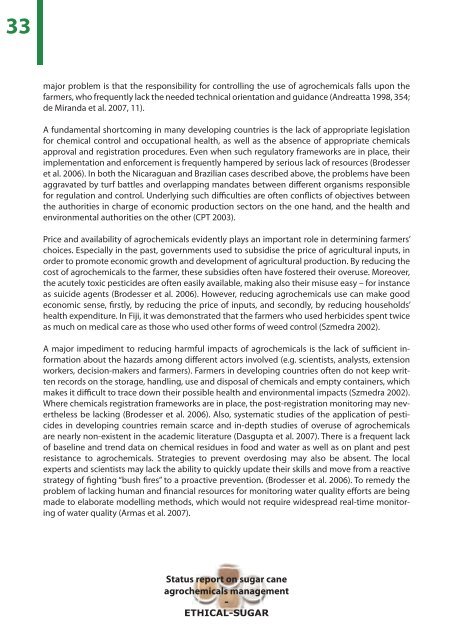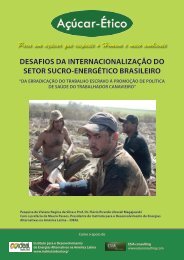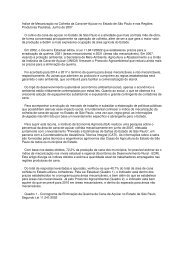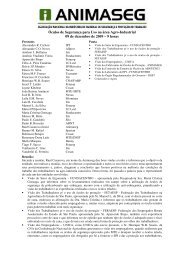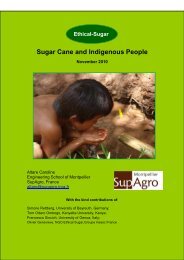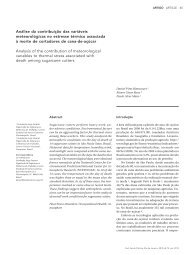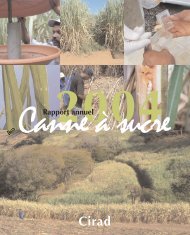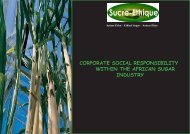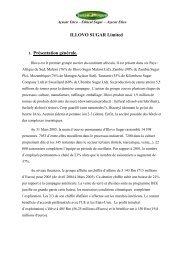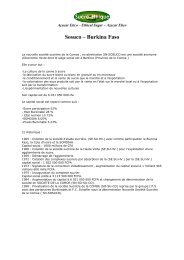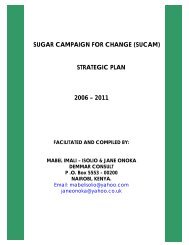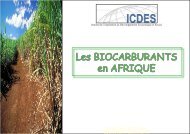Status report on sugar cane agrochemicals ... - Sucre Ethique
Status report on sugar cane agrochemicals ... - Sucre Ethique
Status report on sugar cane agrochemicals ... - Sucre Ethique
Create successful ePaper yourself
Turn your PDF publications into a flip-book with our unique Google optimized e-Paper software.
33<br />
major problem is that the resp<strong>on</strong>sibility for c<strong>on</strong>trolling the use of <strong>agrochemicals</strong> falls up<strong>on</strong> the<br />
farmers, who frequently lack the needed technical orientati<strong>on</strong> and guidance (Andreatta 1998, 354;<br />
de Miranda et al. 2007, 11).<br />
A fundamental shortcoming in many developing countries is the lack of appropriate legislati<strong>on</strong><br />
for chemical c<strong>on</strong>trol and occupati<strong>on</strong>al health, as well as the absence of appropriate chemicals<br />
approval and registrati<strong>on</strong> procedures. Even when such regulatory frameworks are in place, their<br />
implementati<strong>on</strong> and enforcement is frequently hampered by serious lack of resources (Brodesser<br />
et al. 2006). In both the Nicaraguan and Brazilian cases described above, the problems have been<br />
aggravated by turf battles and overlapping mandates between di� erent organisms resp<strong>on</strong>sible<br />
for regulati<strong>on</strong> and c<strong>on</strong>trol. Underlying such di� culties are often c<strong>on</strong>� icts of objectives between<br />
the authorities in charge of ec<strong>on</strong>omic producti<strong>on</strong> sectors <strong>on</strong> the <strong>on</strong>e hand, and the health and<br />
envir<strong>on</strong>mental authorities <strong>on</strong> the other (CPT 2003).<br />
Price and availability of <strong>agrochemicals</strong> evidently plays an important role in determining farmers’<br />
choices. Especially in the past, governments used to subsidise the price of agricultural inputs, in<br />
order to promote ec<strong>on</strong>omic growth and development of agricultural producti<strong>on</strong>. By reducing the<br />
cost of <strong>agrochemicals</strong> to the farmer, these subsidies often have fostered their overuse. Moreover,<br />
the acutely toxic pesticides are often easily available, making also their misuse easy – for instance<br />
as suicide agents (Brodesser et al. 2006). However, reducing <strong>agrochemicals</strong> use can make good<br />
ec<strong>on</strong>omic sense, � rstly, by reducing the price of inputs, and sec<strong>on</strong>dly, by reducing households’<br />
health expenditure. In Fiji, it was dem<strong>on</strong>strated that the farmers who used herbicides spent twice<br />
as much <strong>on</strong> medical care as those who used other forms of weed c<strong>on</strong>trol (Szmedra 2002).<br />
A major impediment to reducing harmful impacts of <strong>agrochemicals</strong> is the lack of su� cient informati<strong>on</strong><br />
about the hazards am<strong>on</strong>g di� erent actors involved (e.g. scientists, analysts, extensi<strong>on</strong><br />
workers, decisi<strong>on</strong>-makers and farmers). Farmers in developing countries often do not keep written<br />
records <strong>on</strong> the storage, handling, use and disposal of chemicals and empty c<strong>on</strong>tainers, which<br />
makes it di� cult to trace down their possible health and envir<strong>on</strong>mental impacts (Szmedra 2002).<br />
Where chemicals registrati<strong>on</strong> frameworks are in place, the post-registrati<strong>on</strong> m<strong>on</strong>itoring may nevertheless<br />
be lacking (Brodesser et al. 2006). Also, systematic studies of the applicati<strong>on</strong> of pesticides<br />
in developing countries remain scarce and in-depth studies of overuse of <strong>agrochemicals</strong><br />
are nearly n<strong>on</strong>-existent in the academic literature (Dasgupta et al. 2007). There is a frequent lack<br />
of baseline and trend data <strong>on</strong> chemical residues in food and water as well as <strong>on</strong> plant and pest<br />
resistance to <strong>agrochemicals</strong>. Strategies to prevent overdosing may also be absent. The local<br />
experts and scientists may lack the ability to quickly update their skills and move from a reactive<br />
strategy of � ghting “bush � res” to a proactive preventi<strong>on</strong>. (Brodesser et al. 2006). To remedy the<br />
problem of lacking human and � nancial resources for m<strong>on</strong>itoring water quality e� orts are being<br />
made to elaborate modelling methods, which would not require widespread real-time m<strong>on</strong>itoring<br />
of water quality (Armas et al. 2007).<br />
<str<strong>on</strong>g>Status</str<strong>on</strong>g> <str<strong>on</strong>g>report</str<strong>on</strong>g> <strong>on</strong> <strong>sugar</strong> <strong>cane</strong><br />
<strong>agrochemicals</strong> management<br />
-<br />
ETHICAL-SUGAR


